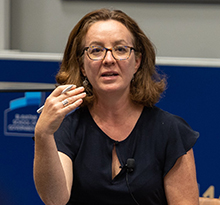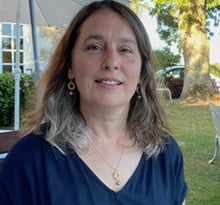Public Policy Challenge Fund
The Public Policy Challenge Fund enables researchers at the University and partners in the policymaking community to collaborate in tackling public policy challenges through an original research project. It contributes to the aims of the Oxford Policy Engagement Network (OPEN) Strategy by facilitating policymakers’ access to the best available evidence and expertise from across the University and supporting the use of research evidence and expertise in decision-making.
Carolyn Hoyle
 Countries which retain death penalty laws but have not carried out executions within 10 years are defined by the UN as 'abolitionist de facto' (ADF). Some continue to sentence to death, resulting in large death row populations. The policy challenge in those countries is twofold: 1) To address both the perceived obstacles to full abolition of capital punishment and to provide the knowledge and tools to navigate these; 2) To modernise the ADF policy framework, originally created 50 years ago, when ADF status was seen as a brief phase inevitably preceding full abolition, requiring little action or reflection. Today, this results in entrenched retention without executions rather than facilitating full abolition.
Countries which retain death penalty laws but have not carried out executions within 10 years are defined by the UN as 'abolitionist de facto' (ADF). Some continue to sentence to death, resulting in large death row populations. The policy challenge in those countries is twofold: 1) To address both the perceived obstacles to full abolition of capital punishment and to provide the knowledge and tools to navigate these; 2) To modernise the ADF policy framework, originally created 50 years ago, when ADF status was seen as a brief phase inevitably preceding full abolition, requiring little action or reflection. Today, this results in entrenched retention without executions rather than facilitating full abolition.
The goal of this OPEN Challenge Fund award was to reconsider and develop the existing definition of ADF, building a new framework to facilitate a precise categorisation of countries' positions on the spectrum of abolition. This award will lead to the creation of a new comprehensive dataset of ADF countries' profiles to identify those best placed to progress towards abolition. This allows staff to target and provide relevant knowledge and tools to meet the needs of policymakers across jurisdictions intent on abolition. The end goal is to provide a roadmap which can be applied across ADF countries at both domestic and international level.
Kate Sullivan de Estrada
 The Indian Ocean is a major conduit for international trade and energy. The region's marine and coastal assets are central to the economic growth, development and connectivity of its littoral states; however, they face multiple forms of maritime insecurity. Over the past decade the Indian Ocean Commission (IOC) has developed a local maritime security architecture to monitor vessel movements and respond operationally to illicit activities - such as illegal, unreported and unregulated fishing, drug trafficking and environmental damage - that devastate local communities. This architecture requires buy-in and resourcing from powerful economic, naval and technological actors, UN agencies and national governments, each with their own policy and security priorities. Buy-in therefore entails trade-offs: taking on policy commitments that serve extra-regional interests; accepting externally conceived projects; or importing geopolitical, inter-state or domestic tensions. Pathways to navigate these complex 'autonomy trade-offs' require careful mapping and evaluation amidst political and economic uncertainty. The project sought to co-produce approaches to external buy-in for the IOC's maritime security architecture that foreground, make visible and reduce 'autonomy trade-offs'. It has mapped multiple perspectives on IOC activities and efficacy via interactions with sub/inter/national stakeholders.
The Indian Ocean is a major conduit for international trade and energy. The region's marine and coastal assets are central to the economic growth, development and connectivity of its littoral states; however, they face multiple forms of maritime insecurity. Over the past decade the Indian Ocean Commission (IOC) has developed a local maritime security architecture to monitor vessel movements and respond operationally to illicit activities - such as illegal, unreported and unregulated fishing, drug trafficking and environmental damage - that devastate local communities. This architecture requires buy-in and resourcing from powerful economic, naval and technological actors, UN agencies and national governments, each with their own policy and security priorities. Buy-in therefore entails trade-offs: taking on policy commitments that serve extra-regional interests; accepting externally conceived projects; or importing geopolitical, inter-state or domestic tensions. Pathways to navigate these complex 'autonomy trade-offs' require careful mapping and evaluation amidst political and economic uncertainty. The project sought to co-produce approaches to external buy-in for the IOC's maritime security architecture that foreground, make visible and reduce 'autonomy trade-offs'. It has mapped multiple perspectives on IOC activities and efficacy via interactions with sub/inter/national stakeholders.
Marina Korzenevica-Proud
 The policy challenge being addressed by this project is unsustainable engagement of communities in water supply projects, contributing to 30% of waterpoints being non-functional in sub-Saharan Africa. Current model of community managed water is being slowly replaced by the professional model of water supply repairment; however, the perspective of community engagement remains unaddressed in both models. Following the SDG 6.1 to reach universal water by 2030, the team sought to redefine the lens of community role by focusing on the responsibilities to end-users. The project also sought to encourage a policy and implementation shift towards a people-centred approach.
The policy challenge being addressed by this project is unsustainable engagement of communities in water supply projects, contributing to 30% of waterpoints being non-functional in sub-Saharan Africa. Current model of community managed water is being slowly replaced by the professional model of water supply repairment; however, the perspective of community engagement remains unaddressed in both models. Following the SDG 6.1 to reach universal water by 2030, the team sought to redefine the lens of community role by focusing on the responsibilities to end-users. The project also sought to encourage a policy and implementation shift towards a people-centred approach.
The ultimate goal of this project is to improve household water access in some of the poorest communities in the world. It will contribute to SDG 6.1 by shifting policy conversations towards more sustainable, ethical and inclusive approach in community management of water supply projects.
Emily Jones
 The UK faces a world in the midst of the climate crisis and the digital revolution, with profound implications for trade policy. As the UK forges ahead with a new trade policy post-Brexit, it needs a trade policy that contributes to net zero and capitalises on the digital revolution. Working in collaboration with the UK Department for Business and Trade (DBT), and leveraging the expertise of the project leads and wider Trade and Public Policy (TaPP) Network they co-direct, Professors Emily Jones (Oxford) and Greg Messenger (Bristol) have developed evidence and identify policy options to inform UK trade policy in the areas of climate and digital. It seeks to ensure that UK trade policy in these areas is evidence-based and reflects the public interest. The project provides concrete, specific, policy proposals based on careful research and create opportunities for brainstorming with government officials.
The UK faces a world in the midst of the climate crisis and the digital revolution, with profound implications for trade policy. As the UK forges ahead with a new trade policy post-Brexit, it needs a trade policy that contributes to net zero and capitalises on the digital revolution. Working in collaboration with the UK Department for Business and Trade (DBT), and leveraging the expertise of the project leads and wider Trade and Public Policy (TaPP) Network they co-direct, Professors Emily Jones (Oxford) and Greg Messenger (Bristol) have developed evidence and identify policy options to inform UK trade policy in the areas of climate and digital. It seeks to ensure that UK trade policy in these areas is evidence-based and reflects the public interest. The project provides concrete, specific, policy proposals based on careful research and create opportunities for brainstorming with government officials.
Elisa Sandoval
Hwange National Park (HNP), Zimbabwe is one of the largest parks in Africa inside the world's largest transfrontier conservation area. HNP is a semi-arid savannah where in the dry season animals depend completely on artificial waterholes. The current water management system in HNP is an unplanned management intervention stemming from the need to supply dry season water, especially for elephants, to benefit the photographic tourism industry. Managing waterholes without proper planning can have implications on wildlife, tourism and local socio-economic development. Surface-water availability drives the distribution and abundance of herbivores (especially elephants), and in turn: carnivores' aggregation, plus distribution grazing/browsing pressure (which affects vegetation structure). Hence, water distribution can indirectly affect the conservation of endangered species, such as African wild dogs.
Currently, there is no national water management plan for artificial water provision in Zimbabwe. A scientific water management legal plan is a high-priority need. This project aims to help wildlife conservation thrive in Zimbabwe through a scientific water management plan in protected areas that benefit wildlife, stakeholders and local communities. The project intends to: formalise a legal scientific-based water management plan with the collaboration of key stakeholders (policy brief creation); and encourage integration of the policy brief within ZIMPARKS and key stakeholders.
Ashwiny Kistnareddy
 The Unaccompanied Asylum-Seeking Children (UASC) team at the Department for Education (DfE) observes that the increase in the number of UASC arriving in the UK over the last couple of years has created a particular challenge for the team, especially that the mandatory National Transfer Scheme means that UASC are increasingly less concentrated geographically.
The Unaccompanied Asylum-Seeking Children (UASC) team at the Department for Education (DfE) observes that the increase in the number of UASC arriving in the UK over the last couple of years has created a particular challenge for the team, especially that the mandatory National Transfer Scheme means that UASC are increasingly less concentrated geographically.
The UASC team is keen to explore remote access as an option. Through observations, interviews, data capture and the collation of resources from organisations that have developed best practice, this project seeks to pool together the resources gleaned from a range of stakeholders within the UK to build a EdTech app, enabling remote access to resources for newly arrived children in different parts of the UK, as well as for the teachers and practitioners who work with them. Ultimately, the project identifies and brings together best practice and resources to be uploaded to a virtual portal or app and set up an accessible space. It has involved young people from the different partner organisations testing the app from the beginning to improve its effectiveness.
James Robson
 Awarding gaps represent a significant regulatory policy challenge in higher education (HE). Awarding gaps are persistent differences in attainment between students with different characteristics, including socio-economic status, race, and disability. These differences in attainment shape graduate labour market outcomes and career trajectories and have the potential to entrench inequalities in society. Universities are introducing a range of interventions to address awarding gaps. However, the Office for Students (OfS), the regulator for HE, faces the policy challenge of designing approaches to evaluating these interventions that ensure they are really targeting the underpinning causes and are making a meaningful difference to graduate outcomes.
Awarding gaps represent a significant regulatory policy challenge in higher education (HE). Awarding gaps are persistent differences in attainment between students with different characteristics, including socio-economic status, race, and disability. These differences in attainment shape graduate labour market outcomes and career trajectories and have the potential to entrench inequalities in society. Universities are introducing a range of interventions to address awarding gaps. However, the Office for Students (OfS), the regulator for HE, faces the policy challenge of designing approaches to evaluating these interventions that ensure they are really targeting the underpinning causes and are making a meaningful difference to graduate outcomes.
This project, therefore, brings together an interdisciplinary team, led by researchers in the Centre for Skills, Knowledge and Organisational Performance (SKOPE) in the Department of Education and the Centre for Teaching and Learning (CTL) to work in partnership with the OfS to address this challenge. The collaboration aims to gain a better understanding the contributory causes of awarding gaps and develop new approaches to evaluation, with the aim of improving the quality and quantity of evaluations across the sector and embedding student voices in evaluation work. In a bid to address persistent inequalities, the project considers what indicators and evaluation approaches can be used to reduce the risk of inequitable outcomes for underrepresented students. It draws on Oxford researchers' expertise in different forms of evaluation, including participatory evaluation approaches that amplify student voices, and a range of creative methods.
Acting as a policy bridge, the project will co-create solutions with policy partners, co-designing guidance on interventions and innovative approaches to evaluation that will improve students' experiences and outcomes and meet the regulatory needs of the OfS. Failing to address this regulatory policy challenge has major implications for social justice and meaningful social mobility in the UK.
Mary Bosworth
 For a number of years, the Greek government has maintained a policy expecting immediate autonomy and self-sufficiency of persons granted international protection. This policy, in conjunction with chronic legal and practical barriers to access to basic rights in many cases results in homelessness and extreme deprivation contrary to the country's international obligations, as
For a number of years, the Greek government has maintained a policy expecting immediate autonomy and self-sufficiency of persons granted international protection. This policy, in conjunction with chronic legal and practical barriers to access to basic rights in many cases results in homelessness and extreme deprivation contrary to the country's international obligations, as
well as exclusion of refugees from the basic documents and socio-economic rights needed to rebuild their lives. The project's goal is to offer evidence-based alternatives to the prevalent polarised discourse on migration in Greece, by providing solid, research- and rights-based information about refugee integration. This information will be used to inform policy making (and public opinion) in a way that reflects the country's international responsibilities, its socioeconomic realities, and the untapped opportunities of integration.
In demonstrating the possibilities and benefits of integration, the project aims to not only challenge the current xenophobic attitudes and approaches to refugees and migrants, but it will map out practical solutions.
Hannah Budnitz
 Electrification of road vehicles won't suffice to reduce transport's contribution to climate change in line with the UK's legal commitments. Reductions in travel demand and shifts to more sustainable modes are also required. A key policy challenge is to understand whether electric vehicle (EV) sharing offers a viable and scalable means to reduce vehicle ownership and mileage in towns and villages, which often receive less attention, less funding, and have fewer transport options than metropolitan or other larger urban areas. The project addressed this challenge by collating evidence and enabling Oxfordshire County and its constituent District Councils, the researcher, car club and charge point operators, and community groups to come together and evaluate the electric car clubs being trialed in ten of Oxfordshire's market towns and villages over the previous 6-12 months. The project has showcased the partnership and the trial at numerous opportunities to promote wider knowledge exchange and opportunities for electric car sharing and related research and innovation in policymaking in towns and villages across the country. You can find out more about Hannah's work on this project in this film, one in our series on Researchers Stories of policy engagement.
Electrification of road vehicles won't suffice to reduce transport's contribution to climate change in line with the UK's legal commitments. Reductions in travel demand and shifts to more sustainable modes are also required. A key policy challenge is to understand whether electric vehicle (EV) sharing offers a viable and scalable means to reduce vehicle ownership and mileage in towns and villages, which often receive less attention, less funding, and have fewer transport options than metropolitan or other larger urban areas. The project addressed this challenge by collating evidence and enabling Oxfordshire County and its constituent District Councils, the researcher, car club and charge point operators, and community groups to come together and evaluate the electric car clubs being trialed in ten of Oxfordshire's market towns and villages over the previous 6-12 months. The project has showcased the partnership and the trial at numerous opportunities to promote wider knowledge exchange and opportunities for electric car sharing and related research and innovation in policymaking in towns and villages across the country. You can find out more about Hannah's work on this project in this film, one in our series on Researchers Stories of policy engagement.